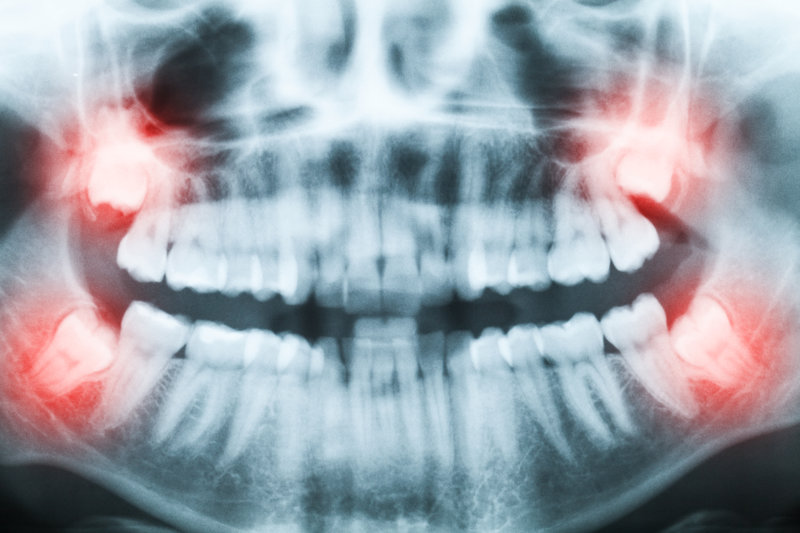Do Wisdom Teeth Have to be Removed?

Your wisdom teeth get their name because they are the last teeth to come in, hopefully when you are older and wiser. Wisdom teeth begin formation much earlier than they erupt, so timing for evaluation and removal is extremely important. The wisdom teeth have a wide range of development age. Because timing for removal is based on wisdom tooth development and not the age of the patient, evaluation may be required as early as 12 years old and as late as 16 years old. We will refer you to an oral surgeon who can recommend the best time for removal.
Removing Wisdom Teeth is One of the Most Common Oral Surgeries
If you’ve had a recommendation for the removal of your wisdom teeth, this is extremely common. In fact, only a very small percentage of the population have the healthy space and appropriate wisdom teeth positioning to let them come all the way in without extraction. The other 85% of us require removal of wisdom teeth in order to prevent pain, infection, loss of adjacent teeth, cyst or tumor development, or discomfort in the mouth. It may also be important to keep our other teeth in proper alignment,
For many, the removal of wisdom teeth is the first “surgery” they will ever have. Our oral surgeon colleagues have an excellent rapport with teenagers and adults alike and will work to make your experience the absolute best that it can be. Most patients go to sleep for the procedure and the newest techniques are speedy and allow for the fastest recovery.
Wisdom teeth can cause problems if they aren’t removed when they should be
If you’re not one of the lucky few who get to keep their wisdom teeth, the emergence of these teeth can cause:
- Pain, swelling and discomfort. If adult molars block wisdom teeth, they get stuck while trying to emerge. This can cause intermittent or chronic swelling, discomfort and pain.
- Infections. In many cases, wisdom teeth emerge partially and then stop because they can’t move any further. The skin around them becomes inflamed and irritated. This tissue can cause infection, causing further pain and discomfort (including swelling, stiffness and even illness). Over time, infections become much more serious if they spread.
- Loss of neighboring teeth. When the gums cannot seal around the molars in front of the wisdom teeth, it allows bacteria under the gum line which can cause root cavities or erode bone between the teeth. This can cause the tooth neighboring a wisdom tooth to be lost.
- Crooked teeth. If wisdom teeth are able to emerge, they sometimes do so at the expense of your other teeth, causing crowding or a shifting of their natural position. Not only does this change how your smile appears, it can also affect your bite and make your teeth and gums more susceptible to bacteria build up that can lead to gingivitis.
- Tumors and cysts. Finally, and most serious of all, poorly positioned wisdom teeth can cause tumors and/or cysts to form. These are very dangerous because they eventually cause the jawbone to erode and can destroy your healthy teeth.
Late removal also increases risks. If the wisdom tooth roots are allowed to completely develop before removal, it can increase more serious risks of nerve injury when they’re finally removed. Timing is very important to remove the wisdom teeth before their roots are completely developed.
The good news is that these issues can almost always be avoided if you have your wisdom teeth removed at the best possible time.
Symptoms or signs that your wisdom teeth need to be removed include:
- Recommendation from us or an oral surgeon based on x-rays and general symptoms
- Pain, swelling or discomfort in the back of the mouth behind your molars
- Tenderness or redness around the wisdom teeth site(s)
- Unusual bad breath
- Stiffness in the jaw
- Infections
- Pain or issues with an adjacent tooth/teeth
- Complications with orthodontic treatments used to straighten other teeth
- The development of cysts or tumors below the site
What Happens During a Wisdom Teeth Removal?
There are several, routine steps to wisdom teeth extraction. While the process might seem a bit daunting to patients – particularly those who haven’t required much dental or medical intervention in the past – it’s a very routine procedure from an oral surgeon’s perspective. It is very rare that there are complications from the extraction process as long as patients follow their doctor’s post-procedure instructions – and these complications can be addressed when they occur.
Extraction experience
If your wisdom teeth are removed at the right time, it’s most likely that they’re unerupted or unable to erupt (impacted) and cannot be seen in the mouth. Most patients have a general anesthetic in the oral surgeon’s office for comfort during the procedure. Afterward, recovery takes a few days and complete healing takes a couple of weeks. Your surgeon will detail what you should expect at your consultation.
Post-surgical instructions
Your surgeon will give you detailed instructions on postoperative care and will be ready to take care of you should you have questions or concerns. Postoperative care is like any surgery and includes careful attention to activity level, diet and hydration. It will also mean taking care of the surgical area.
After your sockets have healed, you’ll have a happier, healthier and more comfortable mouth.
Contact us to learn more about your stress-free wisdom teeth removal. We will refer you to the right oral surgeon for your needs.